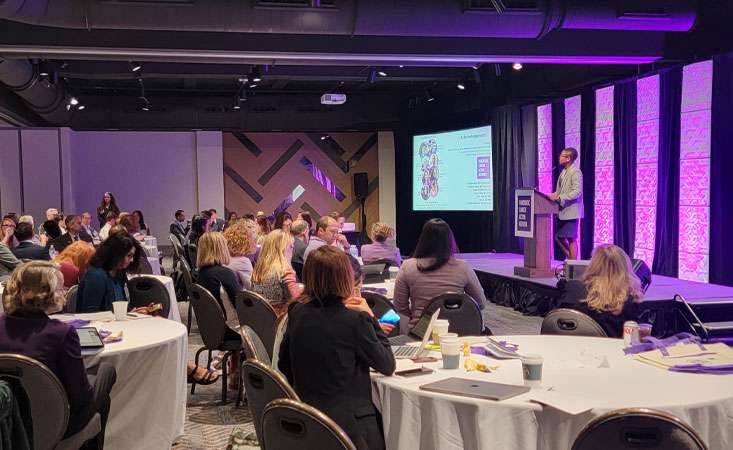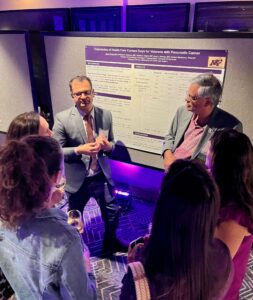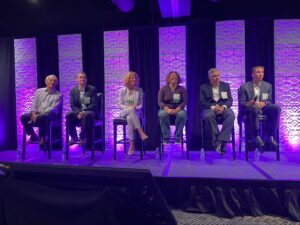
PanCAN Career Development Award recipient Janielle Maynard, PhD, presents her project at the 2024 PanCAN Scientific Summit.
 Editor’s note: The “Research Spotlight” series is written by Dr. Anna Berkenblit, PanCAN’s Chief Scientific and Medical Officer. Each month, Dr. Berkenblit shares her insights into the latest news and research in pancreatic cancer. Follow Dr. Berkenblit on X and LinkedIn.
Editor’s note: The “Research Spotlight” series is written by Dr. Anna Berkenblit, PanCAN’s Chief Scientific and Medical Officer. Each month, Dr. Berkenblit shares her insights into the latest news and research in pancreatic cancer. Follow Dr. Berkenblit on X and LinkedIn.
The PanCAN Scientific Summit is an annual event that brings together our active grantees, Scientific & Medical Advisory Board (SMAB) members, Industry Champions, patient research advocates, and other special guests in a welcoming space to share data and ideas. Prior to the event, I heard from coworkers and members of the community how wonderful the event is – something people look forward to every year, allowing them to see friends and colleagues face to face, learn about breakthroughs in the field, and find opportunities to work together to move progress along faster.
I didn’t really understand how amazing it was until I attended.
We kicked off the event with a lively reception, bringing all attendees together along with members of our Boston volunteer affiliate. Posters were presented by PanCAN grantees who received their awards in 2023, showcasing the first year of progress on their project and allowing other researchers to provide feedback and guidance. Poster highlights included strategies to improve immunotherapy approaches, a project focused on anticipating and overcoming resistance to drugs targeting mutant KRAS, and studies looking at the cost and barriers to access of supportive care medications.

Poster presentation featuring Arjun Gupta, MD, describing his supportive care work to Summit attendees.
Something new this year was inviting staff and grant recipients from Pancreatic Cancer UK. Pancreatic Cancer UK is a fellow member of the World Pancreatic Cancer Coalition, and it was a great opportunity to learn about science being funded by them and meet some of their team members and researchers.
Overall, bringing together senior leaders in the field with junior investigators doing high quality research supported by PanCAN was invigorating – I was so impressed by the scientific rigor and esprit de corps.
PanCAN president and CEO Julie Fleshman gave a presentation highlighting 25 years of PanCAN – what we’ve accomplished and where we’re heading next. When PanCAN started, there was no place for patients with pancreatic cancer and their families to turn to for information and support. There was little in the way of funding for research, and few researchers were interested in the field.
Now, 25 years later, PanCAN is there for patients and families – providing support through our Patient Services program, as the largest pancreatic cancer patient advocacy organization in the U.S. Thanks in large part to PanCAN’s advocacy efforts, federal funding has increased dramatically, and there are many dedicated researchers who have stayed in the field and trained more researchers.
We heard from PanCAN grant recipients from 2022, and what really stood out to me was the diversity of topics discussed – how to identify which people with a recent diabetes diagnosis may be most likely to benefit from screening for pancreatic cancer, artificial intelligence (AI)-driven approaches to predict treatment response, how to understand and treat pancreatic cancer-related pain, and how a patient’s immune response to their pancreatic tumor may differ based on their race or ethnicity.

Members of the Therapeutic Accelerator Collaborative working group discuss their translational research progress.
It was exciting to host a panel discussion with the recipients of the Therapeutic Accelerator Collaborative Awards. The intention of the Collaborative is to conduct lab-based studies in parallel to the early-phase clinical trial conducted by Verastem Oncology, which is funded by our inaugural PanCAN Therapeutic Accelerator Award. The members of the Collaborative are utilizing patient samples to understand why some tumors respond to the investigational treatment and others do not, predicting and devising strategies to overcome resistance, and studying new combination approaches to make the treatment even more effective and its effects more long-lasting.
I am excited about the prospect of doing more collaborative projects like this to bring researchers together to work on pressing problems in the field.
As we look back on the past 25 years and look forward to what’s next, we need to focus on those things that PanCAN is uniquely suited to do to drive the field forward, improve outcomes for everyone impacted by pancreatic cancer and ensure researchers and clinicians continue to enter and stay in the field.
I’m excited to continue on this journey with you.















